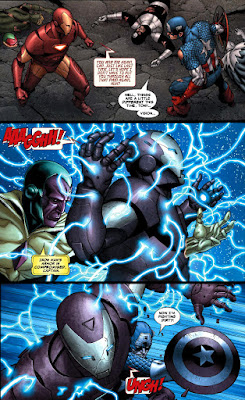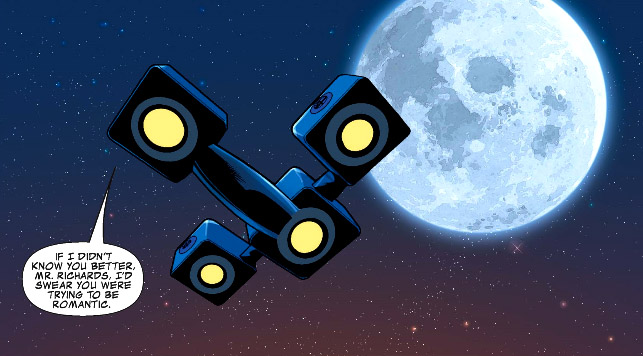The climax to the 2006-07 Civil War seven-issue series perhaps left many of us feeling as if writer Mark Millar and his editors had pulled the rug out from under us and left us baffled and frustrated, given the time (and certainly the $$$) we'd invested in not only the series itself but also in many of its tie-in books. Yet while Millar's presentation was compelled to adhere to a structure that promised battles and bang for our buck, he's correct in pointing out (through Captain America's words of surrender) that Cap's side was winning the battle but failing to win the argument that they were making against the Superhuman Registration Act. In the real world, Cap would have lawyered up and challenged the Act's legality in court on behalf of those who signed his petition with him--a move which, depending on the judge, would likely have blocked the Act from going into effect until the appeals process had run its course.
And yet, here we are, in this series' seventh and final issue--a jailbreak in the government's prison facility in the Negative Zone, with both of the factions involved facing each other in final battle.
We know what would happen if Stark's side prevailed: Cap and his cohorts would have been arrested and imprisoned. And if Cap's side won... what then? Is the SHRA nullified? Does Cap believe he and his supporters would be granted a forum where they can present their case? The answer to either, or both, would almost certainly be a loud and clear "You've got to be kidding, people."
And so an event that Marvel fully invested a year of its time in must have its day--and, as we'll see, a very brief one, all things considered.
As we've previously discovered in a prelude to this moment, Reed Richards firmly believes the Act's implementation is necessary, though for reasons beyond its terms and conditions--a "necessary evil" to ward off ultimate disaster and death as predicted by equations he trusts in with absolute certainty. Yet to his team, he has only disclosed that he supports the Act, and not his true reason for doing so; and in response, his three partners have not reacted in solidarity with his decision, but have instead either joined Cap's side in the matter or, in the case of the Thing, remained neutral by going underground in Paris for the duration.
Yet Reed's wife, Sue, in eventually discovering Reed's true reason for his support of the Act, is understandably disappointed in Reed's decision to, at a minimum, not trust her, and, at worst, lie to her--while Reed, to his way of thinking, only sought to protect her. How they will sort things out between them when the dust settles remains to be seen; but before that can happen, the battle must be decided one way or the other. And though neither side realizes it at the time, the fight's true tipping point comes when the escape route for Cap's group that would have taken them from the Negative Zone to a gateway located on Ryker's Island is locked out--leaving no choice but to use the power of Cloak to teleport everyone to just outside of the Baxter Building in Manhattan, where casualties and the potential for destruction in a mass battle between super-beings were unfortunately more likely to occur.
As for Cap and Iron Man, the principal protagonists in this entire affair, a victory for either would likely give the other's group the momentum they need to bring their foes down. And while Millar appears to realize this, he clearly has other ideas about how this conflict should be settled.
Which is as much space as Millar and artist Steve McNiven have allotted for the climax to this struggle. (After all, there is the story's momentum to still consider--i.e., other titles where the ramifications of Cap's decision can be portioned out and explored, bringing in much more than the mere $3.00 cover price of this one issue.) I can't speak for any of you, but I felt as shell-shocked as those in Cap's abandoned group (who, just as Iron Man once remarked during a previous Avengers battle, were basically left standing there with their super-powers hanging out).
Yet what is interesting is the groundwork being laid in regard to the conflict's aftermath, with Stark and those who supported his cause (and the Act itself) enjoying their laurels in a series of pages practically gushing with promises of a new day for everyone and stability and trust for the future. Those scenes come in the form of a letter addressed to Sue from Reed, who is clearly at ease with not only the peace that has come with the Registration Act which is now the law of the land, but also with the method he used to determine his course of action in regard to which side to back. The tone of the letter is not so much an apology, but a plea for Sue's return--as he seeks to put a happy face on the positive developments that are taking place, while virtually tip-toeing around the more uncomfortable repercussions of the conflict.
And so we pick things up in what would be heralded as the 45th anniversary issue of Fantastic Four, where we find that Sue has indeed returned to the Baxter Building but are greeted with a scene that indicates that both she and Reed have some issues to work through.
Consequently, the couple decide to leave the FF for awhile to work on their marriage, while making arrangements for both Storm and the Black Panther to step in as replacements until their return. It's a two-edged sword of an issue--bringing the FF back together, only to upend the team with such a radical change to a lineup that has endeared readers to this book since its inception. Yet that said, it's surprising how smoothly writer Dwayne McDuffie's script reads and how well the story works from cover to cover, supplemented by a television show that Johnny, Ben, and the Richards children take in which offers a retrospective of the team through interviews with its members as well as with figures from their past. Being partial to the Fantastic Four book and its unique concept amidst the pack of Marvel's other super-hero titles, it was a pleasant way to bring Civil War to a close for me, though it lets Reed off the hook in terms of how he reached his decision to side with Stark. Will he dust off his social dynamics computations to settle his participation in every crisis from now on?
BONUS!
A select offering of segments from that TV special. Happy 45th, Fantastic Four!



























No comments:
Post a Comment